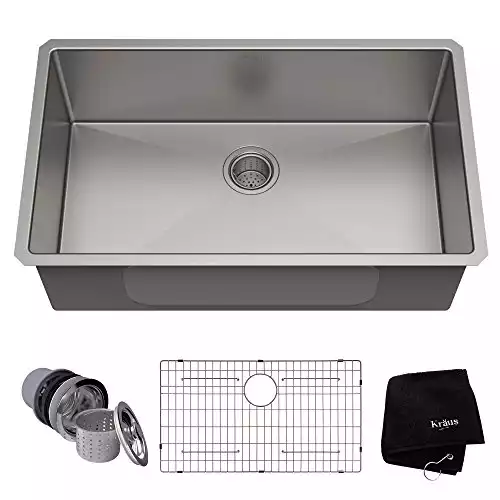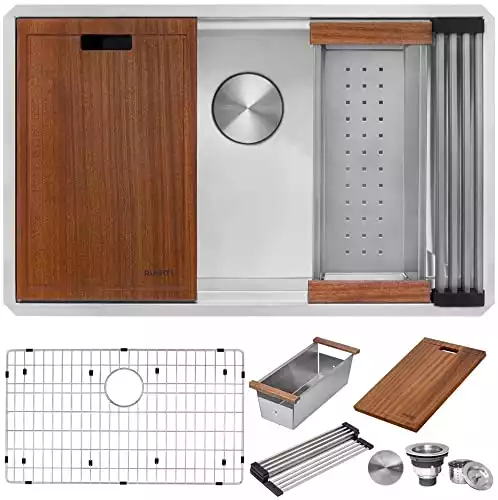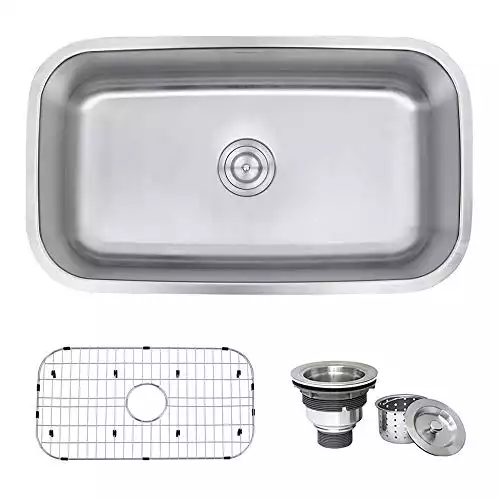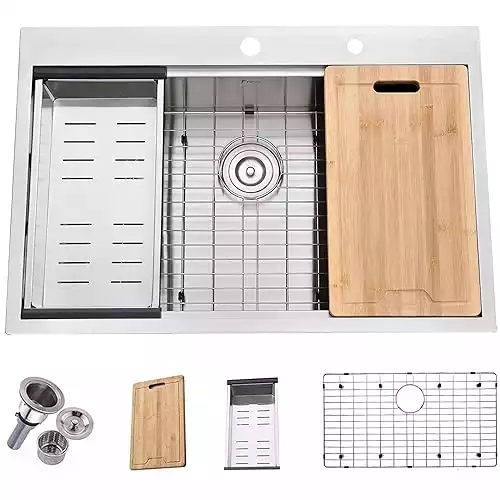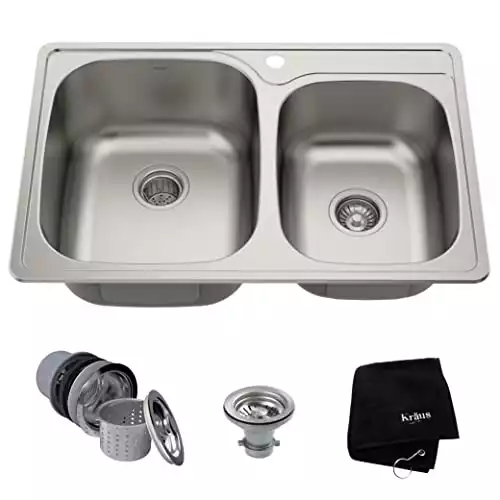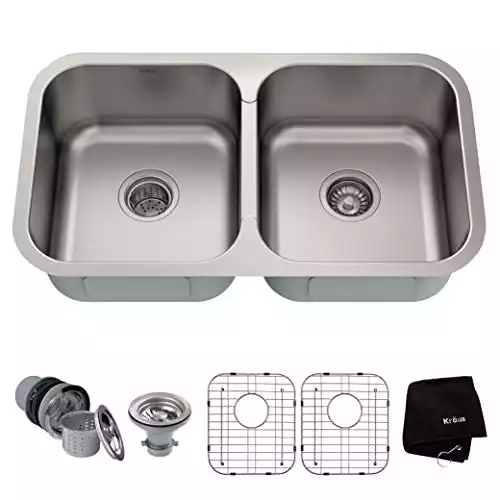Finding the perfect kitchen sink can be a difficult thing because there are so many varieties on the market. Every homeowner, including myself, wants one that will match the current finishes and also leave a clean and sanitary look. Since I wanted to make sure the sink was clean for my family and it was important to do some research before picking out my new kitchen sink.
I was determined to have a stainless steel sink but had no idea what gauge to choose. After doing some research I found that the 16 and 18 gauge sinks were the best, but here is how to choose between those two gauges.
Best 16 Gauge Sinks
1. Kraus Standart PRO 32-inch 16 Gauge Kitche
2. Ruvati 30-inch Workstation Ledge Undermount 16 Gauge Stainless Steel Kitchen Sink
3. Ruvati 32-inch Undermount 16 Gauge Stainles
Best 18 Gauge Sinks
1. Friho 33″x 22″ Inch 18 Gauge Kitchen Sink
2. Kraus KTM32 33 inch Topmount 60/40 Double Bowl 18 gauge Stainless Steel Kitchen Sink
3. Kraus KBU29 32 inch Undermount 50/50 Double Bowl 18 gauge Stainless Steel Kitchen Sink
How Are Sinks Made?
Stainless steel sinks are a popular choice of sinks in homes all around the world. Stainless steel sinks are often made from a process referred to as deep draw forming. During this process, the metal is stretched. The industry sets the gauge for each piece of metal as the gauge that the metal was when it started the stretching process.
If you have a curved sink, the stretching process often takes much longer and makes the metal thinner and less consistent. If you choose to have a straight sink, that is welded together at the end, the metals are often more durable and consistent.
What Does Gauge Mean?
When you look at the gauge for stainless steel materials it can get a little confusing. Typically the higher number something is better, but the opposite is actually true in this case. The lower the number of a gauge, the thicker the material actually is.
This means that a 16 gauge sink is actually thicker and higher quality than an 18 gauge sink. While both options are great, a 18 gauge sink is thicker and therefore has several added benefits that a homeowner would not get if they opted to use an 18 gauge sink.
Benefits of a Thicker Sink
Since the 16 gauge sink is thicker than the 18 gauge sink many homeowners want to know what the benefits of a thicker sink actually are. Typically a thicker sink ensures added durability and quality.
A thicker sink makes the sink itself much quieter. If someone in the home is washing dishes it can be difficult to hear the banging of the pots and pans or the water running through a 16 gauge sink because the metal sink keeps all the noise inside. If you use a garbage disposal it can be difficult to hear it through a thicker sink and is great if you have young children sleeping or want to keep a quiet household. This is a great benefit that you can expect.
Also, thicker sinks are less likely to dent and get damaged. Since the sink is thicker it is stronger and is less likely to get damaged. Thicker sinks also have lower maintenance upkeep that is required. You have to clean the sink less often and polish it less often. It will maintain a clean and sanctuary look.
Disadvantages of a Thicker Sink
While everyone would like to have the highest quality sink in their kitchen, this is often an unrealistic expectation. One of the main disadvantages of a thicker 16 gauge sink is that they are more expensive than a thinner sink. Since you need more material to make the sink thicker, the cost will also be more expensive. If you are looking to shop on a budget you may decide to use a thinner sink because both the 16 gauge and 18 gauge sinks are recommended by experts for a household sink.
Is Thicker Always Better?
While thicker is usually better, this is not always true. Stainless steel sinks are mixed with other metals during the process to help increase strength and overall appeal. Before buying a sink it is important to know what your sink is mixed with and how those chemicals will affect the overall quality and durability of your sink.
Another factor that determines if thicker is actually better in terms of sink thickness is the finish that is on the sink. The finish can play a huge role in the ability to clean your sink and keep it sanitary. Other factors also include straightness and consistency. Oftentimes, the straighter your sink is the less it is stretched during the formation. This means that it retains higher quality metals and is more consistent.
How To Choose The Right Sink?
If you are looking to update your kitchen and you want to add a new sink there are many things that you need to consider before buying one. Some of the main factors that you need to consider include the finish of the sink, style of the sink, drains in the sink, and faucet type. These are all personal preferences that should be left up to the homeowner.
If you decide to use stainless steel for your sink, which is a great choice because of its appearance, cost, and ability to keep clean, you should pick a gauge that you feel comfortable with. Experts recommend using a 16 or 18 gauge sink because of their quality and durability. If you have the money to spend you should always opt for the thicker 16 gauge sink, but if you are shopping on a budget an 18 gauge sink is also great. You should not move up in gauge to a 20 or 22 gauge sink because the quality can significantly decrease at this level. While a thicker sink is great you should always make sure you buy from a reputable and trusted brand to ensure that you get the best sink for your money.
Choosing the right kitchen sink for you and your family is a difficult decision, but if you understand how sinks are measured and rated it can make the process much easier. Choosing a thicker sink has many benefits, but it also comes with an increased price tag. Buying a sink that meets your needs and personal preference should be what is most important.
